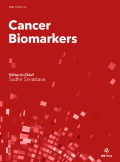Authors: Kang, Ben | Lee, Hyun Seok | Jeon, Seong Woo | Park, Soo Yeun | Choi, Gyu Seog | Lee, Won Kee | Heo, Somi | Lee, Duk Hee | Kim, Dong Sun
Article Type:
Research Article
Abstract:
BACKGROUND: Colorectal cancer (CRC) is one of the leading causes of mortality and morbidity in the world. It is characterized by different pathways of carcinogenesis and is a heterogeneous disease with diverse molecular landscapes that reflect histopathological and clinical information. Changes in the DNA methylation status of colon epithelial cells have been identified as critical components in CRC development and appear to be emerging biomarkers for the early detection and prognosis of CRC. OBJECTIVE: To explore the underlying disease mechanisms and identify more effective biomarkers of CRC. METHODS: We compared the levels and
…frequencies of DNA methylation in 11 genes (Alu, APC, DAPK, MGMT, MLH1, MINT1, MINT2, MINT31, p16, RGS6, and TFPI2 ) in colorectal cancer and its precursor adenomatous polyp with normal tissue of healthy subjects using pyrosequencing and then evaluated the clinical value of these genes. RESULTS: Aberrant methylation of Alu, MGMT, MINT2 , and TFPI2 genes was progressively accumulated during the normal-adenoma-carcinoma progression. Additionally, CGI methylation occurred either as an adenoma-associated event for APC, MLH1, MINT1, MINT31, p16 , and RGS6 or a tumor-associated event for DAPK . Moreover, relatively high levels and frequencies of DAPK , MGMT , and TFPI2 methylation were detected in the peritumoral nonmalignant mucosa of cancer patients in a field-cancerization manner, as compared to normal mucosa from healthy subjects. CONCLUSION: This study identified several biomarkers associated with the initiation and progression of CRC. As novel findings, they may have important clinical implications for CRC diagnostic and prognostic applications. Further large-scale studies are needed to confirm these findings.
Show more
Keywords: Colon mucosa, normal-adenoma-carcinoma, DNA methylation, pyrosequencing, biomarkers
DOI: 10.3233/CBM-203259
Citation: Cancer Biomarkers,
vol. 32, no. 2, pp. 231-236, 2021
Price: EUR 27.50





